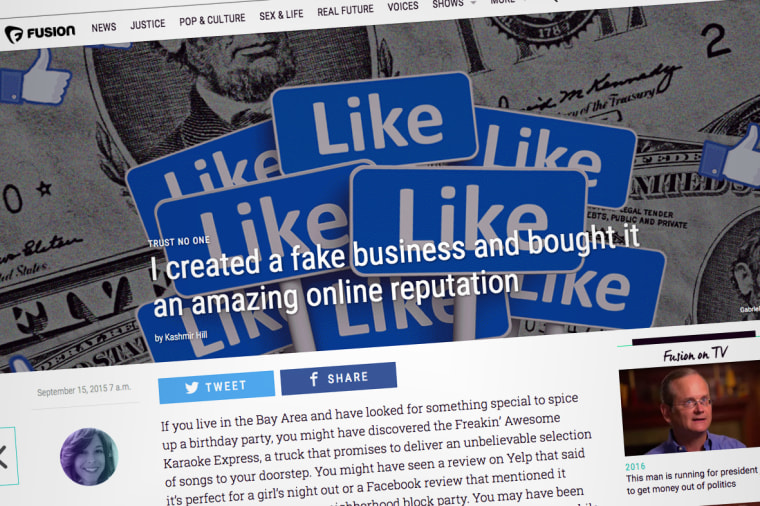In today's digital world, consumers are able to form a perception of a business long before they set foot in the door. But you may want to think twice before basing your opinion of a business solely on its online reviews.
Kashmir Hill said she built an awesome online reputation for the Freakin' Awesome Karaoke Express, a truck that promises to deliver a selection of songs to users' doorsteps. The business accumulated 19,000 Twitter followers and received rave reviews on Yelp and Facebook, but there was one problem: It was a total FAKE.
Freakin' Awesome Karaoke Express, or FAKE, is a perfect example of how easy it is to fraudulently acquire an online reputation — good or bad.

Hill, who's actually an editor for Fusion, paid strangers for the social media praise as a part of an experiment on the fake reputation economy.
"For $5, I could get 200 Facebook fans, or 6,000 Twitter followers, or I could get @SMExpertsBiz to tweet about the truck to the account's 26,000 Twitter fans. A Lincoln could get me a Facebook review, a Google review, an Amazon review or, less easily, a Yelp review," Hill wrote earlier this week in a Fusion report documenting her experience.
Doctorates in Deceit: Fake Diplomas For Sale Online
Fusion said Yelp was the only company that caught on to the scam, hiding the reviews it purchased behind its "not recommended" click wall and not counting them in FAKE's rating. Hill said she used a service called Fiverr to find the offers.
Fiverr maintains that "We only do real reviews. We really try the products. People send them to us," according to the Fusion report. Fiverr did not respond to CNBC's email request for comment and the phone number listed for the company on FactSet was not in service.
Google and Amazon have taken actions to prevent fraudulent review activity as consumers grow increasingly reliant on online ratings. In June, an online Harris Poll survey of about 2,000 adults found that customers take reviews read online seriously, with about 85 percent of respondents saying they would not patronize a business with negative reviews about cleanliness.
Champagne in One Hand, a Selfie in the Other
It's illegal to pay for phony reviews, but there's a demand for them. In fact, Tech research firm Gartner estimates that between 10 and 15 percent of all social media reviews are fraudulent. Twitter's user policy prohibits "fake engagements," which includes purchasing and selling of followers and Facebook has made it a priority to detect and prevent fake likes on business pages.
"This is a perfect example of why Yelp has recommendation software to protect consumers from fake content and attempts to mislead them," Yelp said in a statement.
Google, Twitter, Facebook and Amazon did not immediately respond to CNBC's request for comment.
Read Fusion's report on fake online reputations here.